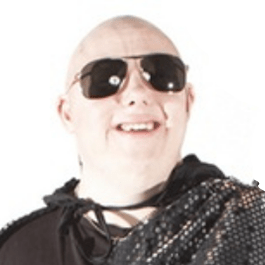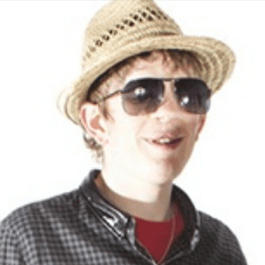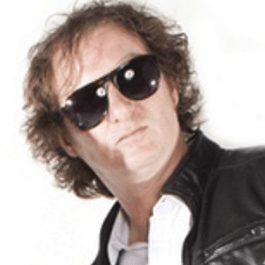In this episode we chat with Rudely Interrupted, an indie rock band from Melbourne.
They share with us their experience of forming a band where all members have a disability, touring the world, recording new songs and getting heard on the radio.
To find out more about Rudely Interrupted go to their website: http://rudelyinterrupted.com/
Click on the Green play button to listen to the podcast on this website.
View Transcript
Fame, Friends and Rock n’ Roll episode transcript
Fiona: Hi everyone and thanks for listening to Visibility, the monthly podcast produced by CID, the Council for Intellectual Disability. Here we’ll be telling our stories and exploring some of the issues that impact people with intellectual disability. To find out more about our work visit www.cid.org.au.
Adele: In the spirit of reconciliation, the Council for Intellectual Disability acknowledges the traditional custodians of country throughout Australia and their connection to land, sea and community. We pay our respect to the elders past and present and extend that respect to all Aboriginal and Torres Strait Islander peoples today.
Alex: Hello and welcome to Visibility, the podcast at the Council for Intellectual Disability. Today we’ll be talking with Rohan, Rory and Sam from the band, Rudely Interrupted, about their experiences as professional musicians. Rudely Interrupted has performed internationally in the US, the UK, in Europe, in New Zealand and in Hong Kong as well. They have also performed hundreds of shows up and down the East Coast of Australia. My name is Alex Elliott, I will be your host today. With me is my co-host, Adele Tashkin.
Adele: Hi, Alex, thank you so much and welcome to Rudely Interrupted. I’m so excited to be chatting to a band today here on Visibility. So we’re here with Sam and Rory and along with Rohan from Rudely Interrupted. Where did the name come from guys?
Rory: The name is actually my idea because I live with so many challenges, you know, being on the autism spectrum, vision impairment, epilepsy and bilateral cleft lip and pallets. I’ve had a lot of rude interruptions to my life since I came up with the name.
Adele: That’s a really great way of tackling the realities of things and making it into something fun.
Rory: And everyone’s life has been rudely interrupted in the last two years because of the pandemic, not least ours as artists.
Adele: That is so right, isn’t it? It’s often been a series of stops and starts and definitely being rudely interrupted, isn’t it? So which member of the band plays which instrument and what role do you all play if I can ask you guys that?
Rory: I’m the lead singer and I play the keyboard.
Sam: I do the dancing man!
Rohan: Sam’s a dancing man, that’s right.
Sam: As always.
Rohan: Yeah, we ask Sam to face the audience. Well, sometimes he runs around the crowd.
Sam: Yeah, crowd!
Rohan: He feels a few beers.
Rory: And Rohan alternates between guitar and drums depending on song slash makeup or band for any given show.
Adele: It’s good to have a multi-instrumentalist to fill in the gas sometimes, isn’t it? And show off a bit.
Rohan: Well, initially when we first started Sam used to play bass and what we’d do is we’d tune the bass to a major key and just use the capo along the neck.
Sam: Yeah, capo!
Rohan: But half way through the song he’d just stop playing and put the guitar down and run around. So we thought we’re just letting him rip now and he’s got a few capes. We do costume changes, don’t we, Sam?
Sam: The king? The king?
Rohan: The king, yeah.
Alex: How long have you been at the band Sam?
Sam: 400 years?
Rohan: Or ever since the first day we started.
Alex: So where did it all begin?
Rory: We’ve had some changes along the way. I met Rohan through my dad because my dad’s a record producer so they used to work together for a time.
Rohan: I was playing drums in a few other bands at the time and he said to me, so you’re a drummer Rohan, how do you make money? I said, look, I work in disability part time and run music programs and he said, oh, you should meet my son. I’d forgotten that I’d written a grant to start a band for folks with disability. When I got back to work, we got the grant. So I thought I’ll ring Rory and see if we can get together. And I think he said, as long as I can sing. Yeah. And the first few weeks of getting together was mayhem, it was really challenging. We’re all so different. Everyone was so excited, you know, and we were just in the room. We had all the instruments there.
Rory: And we were just learning about each other.
Rohan: Yeah. And everyone just went mad. So I think the first session lasted half an hour. And after a few weeks of getting together and we started making music, the drummer at the time, Josh, he’d never played drums before, but he always used to play pots and pans at home. Anyway, so he’d started a coordinated rock beat and keeping time. And I was at the other end of the room and just went, oh my goodness, right. If you can keep time, we can start a song. We had a chorus and off we went and we just practiced the chorus. Don’t break my heart, don’t put my heart over and over again. And there was some really togetherness happening. And we all just went, it sounds pretty good, doesn’t it?
Rory: Yeah. It’s a song that’s really over the last 16 years, it’s really stood the test of time.
Rohan: Slowly. We started writing a few more songs and it seems that long ago in some ways.
Rory: We’re 16 years in April.
Rohan: We weren’t trying to be rock stars, we were just trying to be the best musicians we could be.
Rory: And breaking down perceptions that come with living with disabilities.
Alex: Did people look past the disability when you started or has that taken time?
Rohan: Well, one of the first comments I kind of vaguely remember was, someone heard the music, came to the show and said, oh, I thought you guys were disabled. So, music’s not. A is still A and we are trying to write good songs.
Alex: And then you’ve been called to go overseas. You’ve done Washington, China, Italy with an 80 piece orchestra and Los Angeles. Did you see that kind of success?
Rory: I don’t think we envisioned ourselves doing 14 international tours.
Rohan: Someone sort of said, okay, so you’ve been doing this for 16 years and you’re getting chuffed around the world. We go, whoa, whoa, whoa, hang on a minute.
Rory: Whoa, slow down.
Rohan: But that’s where the music took us and I think it brought us together as, you know, as a group and we get to share some amazing experiences. Some tours when we had the police called to our hotel room because Sam was running up and down.
Rory: We were probably one of the few bands that would come off the road and not hating each other’s guts.
Rohan: That’s right. If we made it home, it was a real success. We were really happy.
Sam: That’s right.
Rohan: So I think Sam mentioned then the heart attack. Well, that was the one the police got called.
Sam: Yeah, they got called.
Rohan: We were in Washington. We weren’t used to the buffet. There was an open buffet.
Sam: Buffet!
Rohan: We got up early in the morning. We grabbed the guys out of the room. We couldn’t find Sam. So we were sort of a little bit worried, but we went down to the buffet and there’s Sam and it was full as a book. So you had enough. Back up to your room, Sammy, we’ll have breakfast. Anyway, so I thought I’ll go up to the room and I went to the elevator. Elevator doors opened up and it was full of fire brigade, ambulance. What’s going on here? And they said, man, down on the ninth!
Sam: Man down, man down!
Rohan: I said, I hope it was not my man anyway. Standing in the elevator. Elevated music up to the night floor doors open. There’s Sam lying on the ground. Man down on the ninth!
Sam: Man down on the ninth!
Rohan: This is my man, Sam. What’s going on? You got a heart attack.
Sam: Heart attack!
Adele: Were you really? Were you having a heart attack?
Rohan: No, no. Just run around and…
Sam: It’s really funny.
Rohan: But they had the defibrillator out. Yeah, and I was like, yeah, Sam, tell me you’re all, this is me. And he’s just laughing at me and so within seconds, I could sort of say there’s something going on and they didn’t defib because it would have killed him.
Alex: Regular little motley crew you are.
Sam: Yeah. So we had a problem.
Alex: In your travels around the world, have you ever met a band like yourself anywhere?
Rory: I don’t think we have.
Rohan: Well, so we have a couple of… So we toured New Zealand with a band called The Mutes from Mars.
Rory: Oh, yes. I tell a complete lie. I should have shut up.
Rohan: Oh, what about in Germany? The mix?
Rory: Tralala Blip.
Rohan: Tralala Blip.
Sam: Tralala Blip.
Rohan: So yeah, we have and we’ve got to tour with some other bands and some of those tours have been really interesting.
Sam: New York.
Rohan: Yeah, New York.
Sam: Canada. London.
Rohan: London.
Sam: Also did London. Dave’s sister.
Rohan: Dave’s sister, yeah. Sam’s got some friends who moved to London and they couldn’t believe he was coming over so they came to the show. Yeah, it was just in awe. It’s like fantastic. Yeah.
Adele: Yeah. That’s so great. So guys, tell me how does it feel playing in front of a live audience?
Rory: It just goes too quick. We do all that work with writing, recording, rehearsing, preparing for shows and then the funnest part is actually playing and that’s why it’s, I mean, that’s very rewarding but it goes too quickly.
Rohan: Yeah, your voice is that right?
Sam: He’s right!
Rohan: Yeah, that hour goes pretty quick.
Adele: So you mentioned that you’ve got a bit of a rotating drummer situation. So there’s usually four people in the band is there?
Rory: So Josh, our original drummer, it’s not easy on the road. It’s really challenging. Josh’s family sort of found some of that challenging for him to be away. It’s not easy, you know, having to sending their kids off around the world in a rock band. We had carers on the road and we did everything we could to support the guys.
Sam: Poor guy.
Rohan: And it was a shame because he really turned into a fantastic drummer. It was really clever in the end.
Rory: It’s just that he wasn’t getting the right support.
Adele: So you lose Josh, how hard is it to actually find a new drummer, a new member of a band like Rudely Interrupted?
Rohan: Well, what do we say? We still haven’t found one really.
But that’s actually kind of a good thing because it means there’s flexibility there. Someone is not available for like any given show. We’ve got options there.
Adele: Thanks guys. It’s great talking with you all today. We’re now going to take a little break before hearing more about life in this unique musical group.
Fiona: You’re listening to Visibility. The podcast produced by the Council for Intellectual Disability. If you enjoyed this episode, you can support us by reviewing us through Apple, Pod Chaser or your favourite listening app.
Alex: Welcome back everyone. Today we’re talking to Rory, Rohan and Sam, members of the band, Rudely Interrupted.
Adele: So how many live performances do you think that you guys have done?
Rory: 558 all up, we believe?
Adele: Just off top of head, just approximately. Wow, that’s impressive. And so for all the success that you’ve had with the band overseas, how easy has it been for you to get gigs here in Australia?
Rory: Well, if I’m honest, it’s actually a lot easier to get big gigs overseas than it has been to get them here.
Rory: Yeah. It was kind of one of the challenges I didn’t expect when we first started with the band. I just thought people are gonna love this. And so if we didn’t create the opportunity, we could never get to where we, we just want to play. So we had to put the shows on ourselves.
Rory: I mean, I don’t want to, I don’t want to sound like a winger, but it can be a thankless task at times.
Adele: Yeah. And so why do you think it has been easier to get gigs overseas than here in Australia?
Rohan: We’ve had the real privilege of being able to see different cultures and disability culture and how it interacts with society in different countries. I mean UK seem to be very advanced in their inclusive practices. And some of the shows we’ve done over there, there were other bands with and without disability. But mostly here, it’s, oh, there’s a festival and it’s for only artists with disability. Recently we just played a festival called…
Rory: Ability Fest?
Rohan: There we go. Which is put together by Dylan Alcott.
Rory: I believe that’s the third time we played at that festival.
Rohan: Yeah.
Adele: What was that like?
Rohan: Well, it was pretty good because… what we loved about it… So we’re playing with really well-known bands and cutting-edge bands. So it’s really big festival and I mean, we sort of had to push to get on there. But they’ve been brought to spec every year and gone, you guys are just fantastic.
Adele: You mentioned that you had to push to get onto that particular festival. Is that because there was lots of other bands of all different abilities?
Rohan: For the first few years, we were the only band with disability. All the others were kind of big Triple J bands, if you like. We’ve got some horror stories about inclusion, but we sent our first single in to Triple J years and years ago. Actually, I flew up there and presented my single and they wrote to me about a week later. And they said, fantastic. We love the single. We’re going to play it. We’re going to introduce it on a show. And so can you tell me a little bit about the band? And that’s when I thought, oh, we’re safe. So these artists live with disability. And that was it. Never heard from them again. And I was absolutely gutted.
Adele: It’s the opposite to what you think would have happened. And the fact that there’s more inclusion and recognition for you overseas means that, you know, as Australians, we have to really think and reflect about inclusion and being able to have all the same opportunities and same platforms.
Rohan: It’s a big barrier to overcome, but through the arts, I think is one of the best ways to overcome some of those barriers.
Alex: And then comes the time when you hear your song played on the radio.
Rohan: Wow.
Alex: For the first time. What’s that like?
Rohan: Just where we come from and the conversation and then the writing and then the learning and then the recording and then the production of it and going through it and then finally hearing it on the radio. Wow. That first little song just found its way on radio. And I actually got a call from Triple M. “So we’ve just come across, Don’t Break My Heart and we just think it’s a fantastic little song. And we’re going to play it on the radio” and I’m like, yeah! And they said, is it true that these guys live with disability? And I sort of said, look, it is. But have you ever rung one of your other artists that you’re about to play and ask if their back story was true before you played it, and he said, no, I don’t think I said, it’s an interesting the way disability works. And so we tuned in on the radio and on it came and god it sounded good. Yeah, it was like such a really big thing for us. And it was part of that motivation too, you know, to be rejected by Triple J, but having the song go bang, bang, bang, take a step all the way to commercial radio. We were like, Whoa. So we’re really proud moments, I think.
Alex: Obviously, the situation now, is it more difficult to be in a band given lockdowns?
Rohan: Yeah, very challenging, hey.
Rory: The first one, that was the national lockdown. I just couldn’t make sense of it. And then the last lockdown we had, or the last two, that sent me to a real downward spiral, almost bottomed out.
Rohan: I think I came over once just to try and break some of that monotony.
Rory: I think you did.
Rohan: Yeah, we did some little, just live on Instagram, Isolaid was a little mini festival.
Rory: I think by that time we had some dates to work with, but that three-week period, late August, early September last year was the worst of the lot.
Adele: It was great that you had one another, and as you said, you were able to go visit and try and do some stuff together.
Rohan: That’s right. We’ve got a few rehearsals coming up soon.
Sam: Yeah.
Rohan: So I’m sort of looking forward to them.
Alex: If there are other people with intellectual disability listening in on this, what opportunities would you say are out there for them to get involved in music?
Rohan: My ultimate goal with the Ruders is always to build a school of music, because there is a real need and there is a real wonder with what music does and the connections we’ve made and the friendships we’ve made and all around the world. So ultimately, we just want to give the opportunity to more people, and then I’d love to take that nationally.
Alex: So what does the future hold for Rudely Interrupted?
Rohan: Ooh, we do have an EP written.
Rory: Yep.
Rohan: We’ve got eight songs here.
Rory: Yes, and now we just need a release plan.
Rohan: We’ve really hit a stride in our songwriting, and when we did get back to the studio at home and started listening to the songs, it was like, wow, this is fantastic.
Alex: So where can we hear your music?
Rory: YouTube, iTunes
Rohan: iTunes. All those.
Rory: It’s on all streaming services, and on our website, RudelyInterrupted.com.
Adele: Thank you. Such a pleasure. You guys are fantastic. Thank you.
Rohan: Thank you very much, guys.
Rory: Our pleasure.
Rohan: Yeah, we really appreciate it.
Sam: Yeah!
Alex: Thanks, Sam, Rory and Rohan for joining us today and sharing such wonderful stories and insights.
Adele: And to those listening, thank you as well. Please join us next month for another episode in a brand new series. So stay tuned for further updates from the podcast team here at CID.
Fiona: You’re listening to Visibility. The podcast produced by the Council for Intellectual Disability. If you enjoyed this episode, you can support us by reviewing us through Apple, PodChaser or your favourite listening app.
* The content and views discussed in this podcast series are those of the individuals involved. They are not necessarily condoned by, or, are the views of the Council for Intellectual Disability or its employees.



 1800 424 065
1800 424 065 













